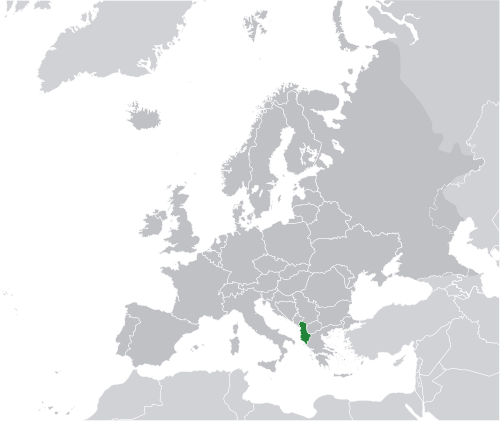 Albania (/ælˈbeɪniə/ (help·info) al-BAY-nee-ə, Albanian: Shqipëri/Shqipëria, Gheg Albanian: Shqipnia/Shqypnia), officially known as the Republic of Albania (Albanian: Republika e Shqipërisë, pronounced [ɾɛpuˈblika ɛ ʃcipəˈɾiːs]), is a country in South Eastern Europe. It is bordered by Montenegroto the northwest, Kosovo to the northeast, the Republic of Macedonia to the east and Greece to the south and southeast. It has a coast on the Adriatic Sea to the west, and on the Ionian Sea to the southwest. It is less than 72 km (45 mi) from Italy, across the Strait of Otranto which links the Adriatic Sea to the Ionian Sea.
Albania (/ælˈbeɪniə/ (help·info) al-BAY-nee-ə, Albanian: Shqipëri/Shqipëria, Gheg Albanian: Shqipnia/Shqypnia), officially known as the Republic of Albania (Albanian: Republika e Shqipërisë, pronounced [ɾɛpuˈblika ɛ ʃcipəˈɾiːs]), is a country in South Eastern Europe. It is bordered by Montenegroto the northwest, Kosovo to the northeast, the Republic of Macedonia to the east and Greece to the south and southeast. It has a coast on the Adriatic Sea to the west, and on the Ionian Sea to the southwest. It is less than 72 km (45 mi) from Italy, across the Strait of Otranto which links the Adriatic Sea to the Ionian Sea.
Albania is a member of the United Nations, NATO, the Organization for Security and Co-operation in Europe, Council of Europe, World Trade Organisation, Organisation of the Islamic Conference and one of the founding members of the Union for the Mediterranean. Albania has been a potential candidate for accession to the European Union since January 2003, and it formally applied for EU membership on 28 April 2009.
Albania is a parliamentary democracy and a transition economy. The Albanian capital, Tirana, is home to approximately 607,467 of the country’s 3.6 million people, and it is also the financial capital of the country. Free-market reforms have opened the country to foreign investment, especially in the development of energy and transportation infrastructure.
The Albanians are descended from the Illyrians, an ancient Indo-European people who lived in central Europe and migrated south by the beginning of the Iron Age. The Gegs settled in the north and the Tosks in the south, along with Greek colonizers. The area was under Roman rule by the 1st century BCE; after 395 CE it became part of the Byzantine Empire. Turkish invasion began in the 14th century and continued into the 15th; though the national hero, Skanderbeg, was able to resist them for a time. After his death (1468) the Turks consolidated their rule. The country achieved independence in 1912 and was admitted into the League of Nations in 1920. It was briefly a republic (1925 – 28), then became a monarchy under Zog I, whose initial alliance with Italy deteriorated into that country’s invasion of Albania in 1939.
After the war a socialist government under Enver Hoxha was installed, and gradually Albania cut itself off from the non-socialist international community and eventually from all other countries, including China, its last political ally. By 1990 economic hardship had fomented anti-government demonstrations that led to the election of a non-communist government in 1992 and the end of Albania’s international isolation. In the late 20th and early 21st centuries, Albania continued to experience economic uncertainty and ethnic turmoil, the latter involving Albanian minorities in Serbia and Macedonia.
Albanian folk music falls into three stylistic groups, with other important music areas around Shkodër and Tirana; the major groupings are the Ghegs of the north and southern Labs and Tosks. The northern and southern traditions are contrasted by the “rugged and heroic” tone of the north and the “relaxed, gentle and exceptionally beautiful” form of the south and the rugged, beautiful east.
These disparate styles are unified by “the intensity that both performers and listeners give to their music as a medium for patriotic expression and as a vehicle carrying the narrative of oral history,” as well as certain characteristics like the use of obscure rhythms such as 3/8, 5/8 and 10/8. The first compilation of Albanian folk music was made by Pjetër Dungu in 1940.
Albania has one of the lowest standards of living in Europe. Approximately 60% of the workforce is engaged in agriculture; the balance is involved in services or industry. The country’s economy contracted in the early 1990s as Albania attempted to move quickly from a tightly controlled state-run system to a market economy. During this period, the unemployment rate was about 40%, but by the end of the decade it was closer to 20%.
Notes from Wikipedia and Answers.com









